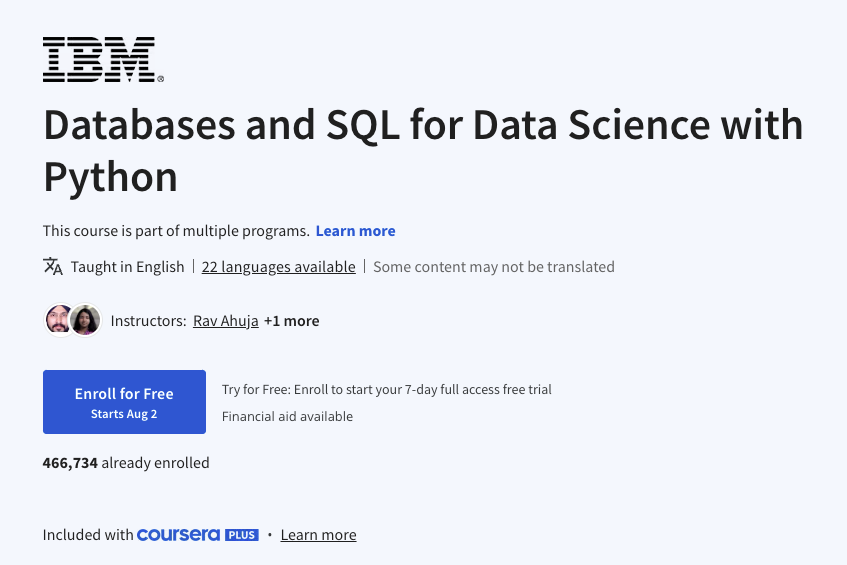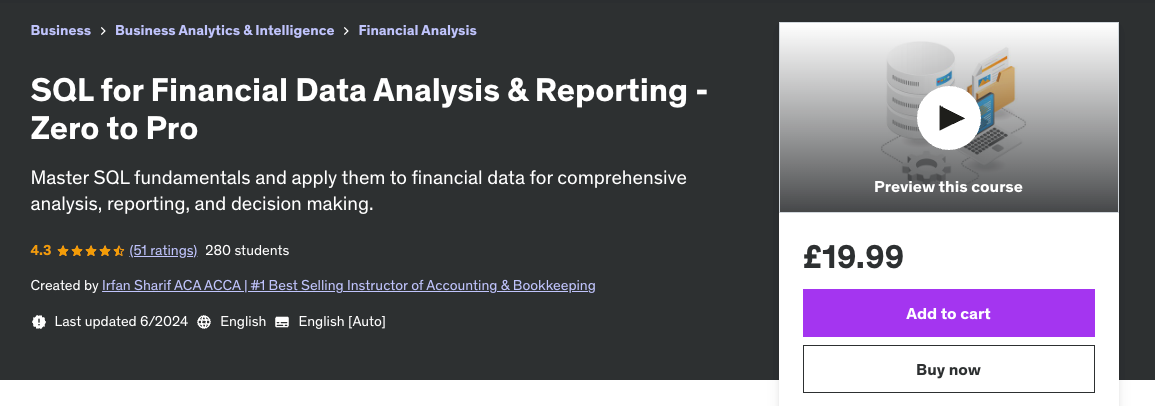- Best SQL courses: Comparison table
- SQL: A Practical Introduction for Querying Databases – Coursera
- SQL Nanodegree Program – Udacity
- Associate Data Analyst in SQL – DataCamp
- Databases and SQL for Data Science with Python – Coursera
- SQL for Financial Data Analysis & Reporting – Zero to Pro – Udemy
- SQL for Business Analysts – DataCamp
- Are SQL courses worth it?
- Is SQL a high paying skill?
- Should I learn Oracle SQL or MySQL?
- Should I learn SQL, Python or Tableau first?
- Methodology
Structured Query Language, or SQL, is the universal language for managing and manipulating relational databases. As data is central to so many industries, being able to analyze it effectively and efficiently is a valuable skill.
Professionals from database administrators and software developers to data scientists and financial analysts rely heavily on SQL to perform tasks like data retrieval, analysis and reporting. It also consistently ranks within the top 10 most popular programming languages on the TIOBE Index, even rising to eighth place in the last year.
Given its pervasive use and the lucrative job opportunities it unlocks, learning SQL is a strategic move for anyone looking to excel in the tech and data sectors. TechRepublic takes a look at the top six SQL courses available in 2024 for learners with different experiences and goals.
SEE: Can Microsoft Copilot Write Simple SQL Commands for You?
Best SQL courses: Comparison table
SQL: A Practical Introduction for Querying Databases – Coursera
SQL: A Practical Introduction was developed by tech giant IBM to quickly teach the fundamentals of SQL to complete beginners. This course is perfect for interested learners without much time available to dedicate since it only takes 21 hours and can be completed through one hour bursts. It covers basic SQL statements, creating relational databases, views, transactions, joins and more, delivered through videos, readings and quizzes. The content is applicable to many relational database management systems, including MySQL, PostgreSQL, IBM Db2, Oracle and SQL Server.
Price
$49/£38 per month after seven-day free trial.
Duration
21 hours.
Pros and cons
| Pros | Cons |
|---|---|
| Great for giving confidence to complete beginners. | Could be too basic for some learners. |
| Free if completed within a week. | Course fee would seem expensive if not completed within a month. |
Prerequisites
None, but some basic data literacy is beneficial.
SQL Nanodegree Program – Udacity

The SQL Nanodegree Program from Udacity is longer and more in-depth than the Coursera course. While it does require a basic understanding of SQL, the course does begin by covering key commands, joins, aggregations and subqueries before launching into more advanced topics such as MongoDB, RDBMS and foreign keys. What really sets the Udacity course apart are the mentors who provide personalized feedback and answer learner questions throughout, but it also comes with a heavier price tag. Learners are provided with a certificate upon completing the course, which can be promoted on their resume and LinkedIn profile.
Price
$249/£196 per month after seven-day free trial.
Duration
80 hours.
Pros and cons
| Pros | Cons |
|---|---|
| Provides access to mentors who review projects and answer questions. | Expensive. |
| Certificate awarded upon completion. | Availability of mentors varies. |
Prerequisites
Basic SQL.
Associate Data Analyst in SQL – DataCamp

The Associate Data Analyst in SQL course and certification is perfect for aspiring data analysts looking for an applicable grounding in SQL. DataCamp provides exercises based on real-world datasets, like motorcycle part sales and student mental health stats, helping to keep content interesting and relevant. Instructors start with general SQL before moving on to techniques and tools used in data analytics, like PostgreSQL. Instructors include data scientists, data evangelists and consultants, and learners receive a Statement of Accomplishment upon completion.
Price
$13/£11 per month.
Duration
39 hours.
Pros and cons
| Pros | Cons |
|---|---|
| Specific to data analysts. | Some reviewers say the exercise can be difficult and take longer than the allotted time. |
| Covers non-SQL topics that supplement understanding, including statistics. | Different instructors’ teaching styles may not work for all learners. |
Prerequisites
None.
Databases and SQL for Data Science with Python – Coursera

While data analytics deals with solving defined business problems, data science involves using more advanced techniques to make broader predictions, dealing with the unknown. Both fields do use SQL, but in different ways — so courses that cover the database querying language within the proper context would be most useful. The Coursera offering Databases and SQL for Data Science with Python, prepared by IBM, is intended specifically for aspiring data scientists. It focuses on using SQL and databases to handle large-scale datasets and perform complex queries, which are essential for building data-driven models. It also covers integrating SQL with Python to preprocess data for machine learning algorithms and to automate data workflows.
Price
$49/£38 per month after seven-day free trial.
Duration
20 hours.
Pros and cons
| Pros | Cons |
|---|---|
| Beginner level. | Steep learning curve. |
| Free if completed within a week. | Narrow focus on datasets and SQL, leaving less room for other aspects of data science like ML algorithms. |
Prerequisites
None.
SEE: The 7 Best Data Science Courses That are Worth Taking in 2024
SQL for Financial Data Analysis & Reporting – Zero to Pro – Udemy

SQL is used often in the finance sector for activities including managing large transactional databases, calculating risk, tracing investment performance and generating reports. Finance professionals seeking an overview of SQL that relates to their profession need look no further than SQL for Financial Data Analysis & Reporting on Udemy. Taught by an accountant, it covers SQL fundamentals like writing queries to filter, group and sort data, performing complex joins and using functions for data aggregation and reporting. Learners will then cement these skills by learning to generate reports like balance sheets and profit and loss statements and preparing key financial analytics like profitability and liquidity ratios.
Price
$20/£19.99 per month
Duration
5.5 hours.
Pros and cons
| Pros | Cons |
|---|---|
| Teaches SQL in the context of financial reporting and analytics. | Those with a limited background in finance may feel the explanations are not sufficiently detailed. |
| Low time commitment. |
Prerequisites
Basic knowledge of financial reports.
SEE: The 5 Best Udemy Courses That Are Worth Taking in 2024
SQL for Business Analysts – DataCamp

This DataCamp course is designed specifically for business analysts working in marketing, finance or product who already have a basic understanding of databases and SQL. Business analysts typically use SQL to identify trends, issues and opportunities for improving business efficiency in large data sets. Therefore, this course includes lessons on filtering, aggregating and joining tables to extract and analyze data, as well as creating summary statistics and visualisations to support data-driven decision making. Examples cover using SQL to calculate profit, revenue and other KPIs that business analysts often work with.
Price
$13/£11 per month.
Duration
20 hours.
Pros and cons
| Pros | Cons |
|---|---|
| Teaches SQL in the context of business analytics. | Different instructors’ teaching styles may not work for all learners. |
| Reasonably priced. |
Prerequisites
Basic SQL knowledge and database familiarity are recommended.
Are SQL courses worth it?
Simply typing in ‘SQL courses’ on Google yields hundreds of results, as there are many providers out there looking to capitalize on the growing appetite for digital skills and the opportunities they unlock. Courses, therefore, can vary in quality, ultimately meaning a significant proportion may not be deemed “worth it” by learners.
However, the best courses, prepared by subject matter experts and qualified educators, can make a real difference. According to Coursera’s 2023 Learner Outcomes Report, 77% of learners reap career benefits as a result of their course, such as getting a new job, earning a promotion or gaining applicable career skills.
For those who struggle with self-motivation, a SQL course can help them stay committed and complete the training. The structured approach ensures that they systematically build skills and apply best practices. Many courses also offer certification upon completion, like Udacity’s SQL Nanodegree, which can enhance job applications, appeal to employers and serve as further motivation. According to the University of Michigan, students aiming for a certificate are more likely to complete a course of study than those who aren’t.
On the other hand, there are many other resources available, like YouTube videos, discussion boards and open-source projects, that can help disciplined learners gain SQL skills at their own pace without the need for a course. Ultimately, whether a learner will find a course worth it will depend on its quality and their own learning style.
Is SQL a high paying skill?
Yes, SQL is considered a high-paying skill. SQL developers, who manage databases through SQL queries and scripts, have an average salary of $95,000 in the U.S. and £44,000 in the UK, not including bonuses, profit sharing or other additional wages, according to Glassdoor. Furthermore, database administration, which heavily relies on SQL, is among the top IT jobs with substantial salaries, often reaching well over $100,000 annually.
Should I learn Oracle SQL or MySQL?
Oracle SQL is often used in large enterprises to complete high-volume and complex database transactions, making it most valuable within industries like finance or healthcare. MySQL, on the other hand, is widely used in web development and by startups due to its open-source nature and ease of use. The best language to learn first will be the one that aligns most with your career goals. However, MySQL is easier for beginners.
Should I learn SQL, Python or Tableau first?
SQL, Python and Tableau are three different skills that are most useful in different professional contexts. SQL is fundamental for managing and querying databases, and 52.9% of data analyst job postings mention it, demonstrating its demand within the industry.
Python is a highly versatile and widely used programming language used extensively for data analysis and machine learning. It frequently tops the TIOBE Index and is essential for much in-depth data manipulation and analysis.
Tableau is a visual analytics platform that is useful for presenting data insights effectively. Learning how to use Tableau can be advantageous if your goal is to create impactful visualisations and dashboards.
Due to the demand for SQL and its ease compared to Python, starting with it could be the most beneficial. If you then want to advance your analytical capabilities, you can work toward a qualification in Python. Alternatively, if your role warrants a lot of data visualisation work, you could decide to learn to use Tableau.
Methodology
When assessing online courses, we examined the reliability and popularity of the provider, the depth and variety of topics offered, the practicality of the information, the cost and the duration. The courses and certification programs vary considerably, so be sure to choose the option that is right for your goals and learning style.
SEE: How to Use Tableau: A Step-by-Step Tutorial for Beginners





